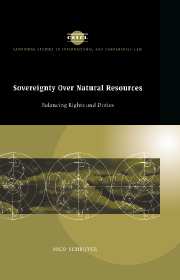Book contents
- Frontmatter
- Contents
- List of boxes, figures and tables
- Preface
- Acknowledgments
- List of abbreviations
- List of main symbols used in UN documents
- Glossary
- Table of cases
- 1 Introduction
- PART I The birth and development of the principle: the UN General Assembly as midwife
- Introductory remarks to Part I
- 2 The formative years (1945–1962)
- 3 Promoting economic development by the exercise of permanent sovereignty: the period after 1962
- 4 Permanent sovereignty, environmental protection and sustainable development
- 5 Permanent sovereignty over natural resources in territories under occupation or foreign administration
- PART II Natural-resource law in practice: from creeping national jurisdiction towards international co-operation
- PART III Balancing rights and duties in an increasingly interdependent world
- Appendices
- Bibliography
- Index
- Books in the series
5 - Permanent sovereignty over natural resources in territories under occupation or foreign administration
Published online by Cambridge University Press: 23 October 2009
- Frontmatter
- Contents
- List of boxes, figures and tables
- Preface
- Acknowledgments
- List of abbreviations
- List of main symbols used in UN documents
- Glossary
- Table of cases
- 1 Introduction
- PART I The birth and development of the principle: the UN General Assembly as midwife
- Introductory remarks to Part I
- 2 The formative years (1945–1962)
- 3 Promoting economic development by the exercise of permanent sovereignty: the period after 1962
- 4 Permanent sovereignty, environmental protection and sustainable development
- 5 Permanent sovereignty over natural resources in territories under occupation or foreign administration
- PART II Natural-resource law in practice: from creeping national jurisdiction towards international co-operation
- PART III Balancing rights and duties in an increasingly interdependent world
- Appendices
- Bibliography
- Index
- Books in the series
Summary
In chapter 3 it was noted that during the 1960s the discussion on the principle of permanent sovereignty over natural resources was increasingly confined to developing countries. From the early 1970s, the General Assembly and other UN organs also frequently stressed the principle that permanent sovereignty included the right of peoples to regain effective control over their natural resources. For example, in Resolution 3171 (XXVIII) the General Assembly ‘supports resolutely the efforts of the developing countries and of the peoples of the territories under colonial and racial domination and foreign occupation in their struggle to regain effective control over their natural resources’. The NIEO Declaration stipulates that the right to permanent sovereignty includes, in case of violation, the right to ‘restitution and full compensation for the exploitation and depletion of, and damages to, the natural resources and all other resources of those States, territories and peoples’. Problems have arisen over the question of permanent sovereignty in territories being administered and/or occupied by third States. In this chapter three cases are reviewed. Firstly, South West Africa/Namibia: its status and the exploitation of its vast mineral and fish resources by South Africa, other States and foreign enterprises. Secondly, the exploitation of resources of the Sinai and other territories occupied by Israel. Thirdly, the operation and administration of the Panama Canal and Zone.
- Type
- Chapter
- Information
- Sovereignty over Natural ResourcesBalancing Rights and Duties, pp. 143 - 168Publisher: Cambridge University PressPrint publication year: 1997

